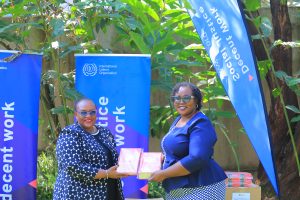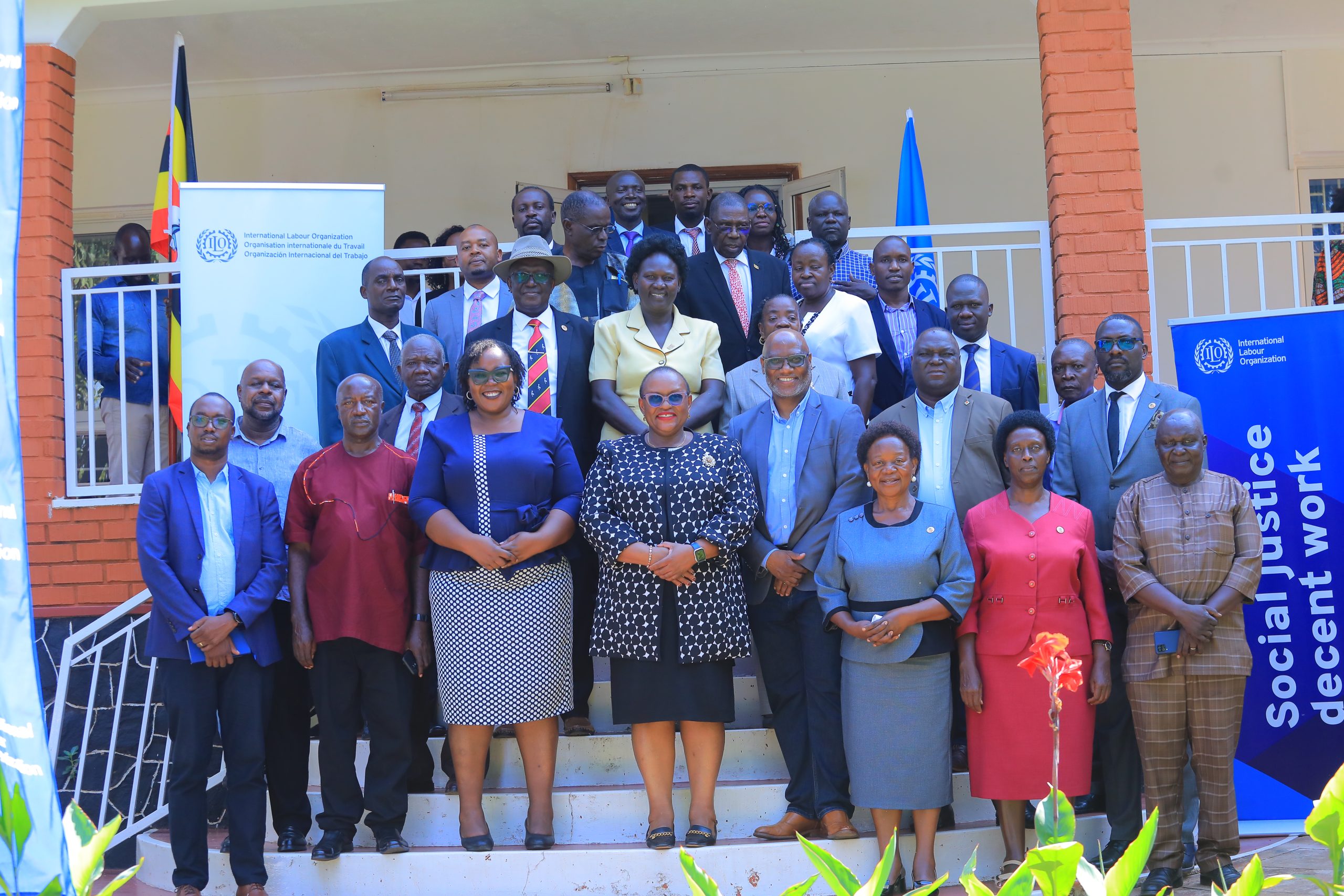The International Labour Organization (ILO) has today, Friday, 13 September 2024, held a significant handover ceremony at its headquarters in Kampala, marking a major milestone in Uganda’s journey toward digital transformation in labour justice and the strengthening of workers’ rights.
The event, presided over by Ms. Caroline Khamati Mugalla, Director of the ILO Country Office for the United Republic of Tanzania, Burundi, Kenya, Rwanda, and Uganda, marked the official handover of key items from various ILO projects aimed at enhancing Uganda’s labour sector. The Items included; a vehicle, tablet computers, Logistics Management Information Systems (LMIS) Servers, and copies of the 7th Edition of Laws Compendium of Uganda.
This handover represents a critical step toward ensuring that all workers in Uganda, including the most vulnerable, can access swift and just resolution of labour disputes.
“The ILO remains committed to strengthening the systems that uphold workers’ rights and ensuring that we empower national institutions to deliver justice more effectively,” says Khamati Mugalla.
Digitalization of the Industrial Court, by the ILO PROSPECTS Project
As part of the ILO PROSPECTS project promoting refugee and host community livelihoods, the Industrial Court of Uganda is undergoing a comprehensive digital transformation to enhance efficiency and access to justice for both refugees and host communities. The initiative aims to modernize the court’s operations and address longstanding challenges, ensuring swifter and more transparent resolution of labour disputes.
The handover included the provision of notetaking computer tablets to key judicial officers and panelists representing workers and employers, facilitating improved court sessions. Hon. Justice Linda Lillian Tumusiime Mugisha, Ag. Head Judge, Industrial Court, expressed optimism that the digital tools received will significantly enhance the court’s ability to process and resolve cases in a timely, fair, and transparent manner.

Moreover, efforts are underway to implement technological upgrades based on a comprehensive assessment of the court’s digital limitations. The ongoing digitalization process is currently focusing on key court halls in Kampala, Mbarara, and Lira, with the goal of reducing case backlogs, streamlining legal research, and enhancing the efficiency of the judicial process.
Legal Compendium for the Industrial Court, by the ILO CAPSA Project
The ILO, through the CAPSA project, provided the Industrial Court with the newly revised 7th edition of Uganda’s consolidated laws. These legal resources are vital in ensuring that the court’s decisions are accurate, credible, and based on the most current legal frameworks. This initiative is expected to significantly improve the court’s ability to process cases and promote a more transparent and fair legal process for both employers and employees.
“These updated legal resources will be instrumental in ensuring that the decisions made by the Industrial Court are both efficient and credible. The consolidated laws allow our judicial officers to work with the most up-to-date information, eliminating delays caused by outdated references,” says Hon. Justice Linda Lillian Tumusiime Mugisha.
Labour Management Information Systems (LMIS) Digitalization, by the ILO Better Regional Migration Management (BRMM) Project
In collaboration with the UK Foreign, Commonwealth and Development Office (FCDO), the ILO is supporting the Better Regional Migration Management (BRMM) project, which seeks to strengthen the capacities of countries in East and Horn of Africa to govern labour migration through evidence-based policies.
The BRMM project in Uganda is focused on developing a Labour Management Information System (LMIS) to enhance the governance of labour migration and improve migrant workers’ qualifications and skills while engaging social partners.
“The new LMIS servers will transform how we collect, manage, and analyze labour market data. This will not only benefit the Ministry but also all stakeholders in Uganda’s labour sector, as we can now deliver more responsive and evidence-based services to employers and workers,” says Aggrey Kibenge, Permanent Secretary, Ministry of Gender Labour and Social Development.
The ILO’s initiatives in Uganda align with the organization’s broader commitment to promoting decent work and ensuring that workers, including those in vulnerable situations, have access to fair and timely labour justice.
Vehicle to Support Workers’ Rights Advocacy across Uganda:
In addition to the digital equipment and compendium, ILO handed over a vehicle to the National Organization of Trade Unions (NOTU) to support their operational capacity. This vehicle will enable NOTU to expand its outreach efforts and continue advocating for workers’ rights across Uganda.
ILO and NOTU have a longstanding partnership, working together to protect and promote the rights of workers in Uganda, particularly those in the informal sector. The provision of this vehicle underscores the ILO’s commitment to strengthening institutions that advocate for decent work and workers’ protection in the country.
The vehicle was received by Richard Bigirwa, the NOTU ,Secretary-General. “With this support from the ILO, we are now in a stronger position to reach more workers across the country and ensure that their rights are protected. This vehicle will help us to extend our efforts in promoting fair labour practices in even the most remote areas,” says Bigirwa

The handover ceremony marked a critical moment in Uganda’s journey toward enhancing labour justice and strengthening workers’ rights. By providing digital tools, legal resources, and operational support, the ILO is helping to create a more efficient, transparent, and fair labour system that benefits all workers, including refugees and those in the gig economy.










